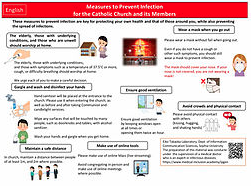
(4th Sunday A) - The BE-attitudes
January 29, 2023 St Ignatius 12:00
At the beginning of one of his books, Fr Sawada Kazuo says,
When reading the Bible, don’t get hung up on what you can’t understand. Just grab on to what you do understand.”

That’s good advice and I think we can use it for today’s gospel, the so-called beatitudes—eight, actually nine, gems of Christian wisdom from the Lord Jesus.
I think that the four beatitudes, or BE-attitudes, that we easily relate to are “Be pure of heart. Be gentle. Be merciful. Be peacemakers.”
The “pure of heart” are people who are straightforward, who do not say one thing today and do the opposite tomorrow, who are ready and open to listen to others and help them if they can.
Being “gentle”—or “meek” as others translations say—does not mean letting people take advantage of you and walk all over you. It means rather to have an attitude of kindness and respect not only for people, but for all of God’s creation.
The “merciful” are people who understand the weaknesses and needs of others because they know their own weaknesses. They do not judge or condemn others rashly because they know that they, too, have not been condemned but forgiven by God. Like Jesus, they too show others the face of God’s mercy.
The “peacemakers” are those who are careful not to cause little wars around them by entering into open conflict with others. They rather set aside their differences; they pray and work for peace and solidarity among peoples and nations by looking for areas of agreement and reconciliation.
These are the BE-attitudes that we can appreciate easily. Be pure of heart. Be gentle. Be merciful. Be peacemakers. Let’s see what we can make of the other beatitudes.
Being “poor in spirit” does not mean being spiritually poor, or having no virtues to speak of. It means not being tied down to whatever material wealth we may have, or if we are not so well off, to make do with what we have and to accept humbly whatever public welfare or private help may be provided for us.
When Jesus says “Happy are those who mourn,” he is not praising those who are constantly moaning about how weak they are or how they are treated by others. Jesus is urging us to “weep with those who weep”—to join him in offering support and comfort to those who are suffering from some personal loss or physical pain, because he himself experienced being betrayed by close companions and being stripped of clothes and honor when crucified.
And it is the example of Jesus that urges us to “hunger and thirst for what is right.” Think of people like Martin Luther King or Nelson Mandela, advocates for the rights of oppressed people.
They are also examples of people who were “persecuted in the cause of right.” Imprisoned or assassinated, they put their life on the line to bring about the rule of God on this earth and were rewarded by their share in the eternal life promised by Jesus and by our memory of them as faithful servants of God and heroes of humankind.
Jesus calls these people “happy, or blessed” because God loves them and is right there among them in the person of Jesus, who shares their poverty, their hunger, their sorrow and persecution.
So when Jesus says “Blessed are you who are poor, you who mourn, you who hunger for what is right and are persecuted for pursuing it,” he is not uttering a blessing on misfortune. He is rather looking directly at the poor people gathered around him and says that the advantage belongs to those who approach the kingdom of God with the greatest need and the greatest capacity to appreciate its values, undisturbed by attachment to worldly goods, excessive concern for self-indulgent joy, or inordinate desire for human glory.
To paraphrase Jesus: Blessed are those who, though not so well off themselves, make an effort to help and feed others. Blessed are those who, because they know sorrow and ill treatment by others, can console and strengthen those who mourn or are sidelined by society.
Let’s be aware of the blessings we have received so as to bring God’s goodness to others. Let’s strive in whatever way we can not to rest until we can extend the blessings of food and housing and education to everyone, especially to those who are now in greatest need.
Robert Chiesa SJ
 ENGLISH
ENGLISH  ESPAÑOL
ESPAÑOL 







